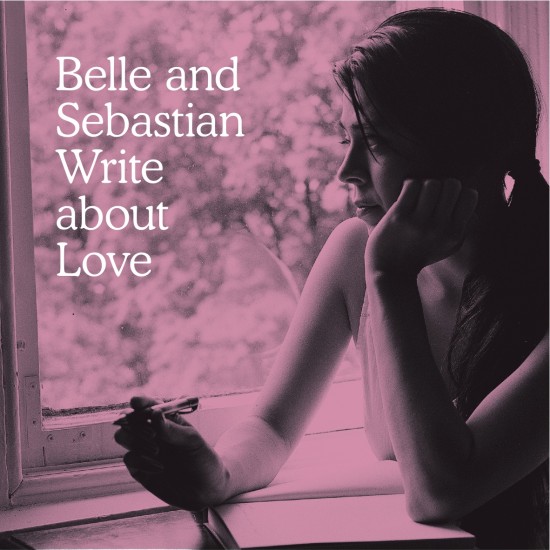by Nick Ubels (Online Editor)
 “Make me dance, I want to surrender,” sings Stuart Murdoch on the infectious album-opener “I Didn’t See It Coming,” succinctly summing up the mood shared by Belle & Sebastian’s recent sequence of pop-inspired LPs.
“Make me dance, I want to surrender,” sings Stuart Murdoch on the infectious album-opener “I Didn’t See It Coming,” succinctly summing up the mood shared by Belle & Sebastian’s recent sequence of pop-inspired LPs.
On Belle & Sebastian Write About Love, the celebrated Scottish septet follow-up their most vigorous pop record, The Life Pursuit, by picking up where they left off nearly four years ago, albeit on a considerably mellower note.
The Life Pursuit producer Tony Hoffer returns for his second outing with the band, once again delivering a clean, full-bodied, 60’s-inspired sound that is well-suited to the material, highlighting Belle & Sebastian’s warm, melodic bass lines in particular.
Although Write About Love is more subdued than its predecessor, often trading in the fuzz bass for more introspective fare reminiscent of mid-90’s Belle & Sebastian, band leader Stuart Murdoch & Co. seem more self-assured as can be seen in Mick Cooke’s complicated arrangements and the band’s ambitious song writing. Yet this newfound confidence does not always work to the band’s advantage.
While many standout Life Pursuit tracks such as “White Collar Boy” and “Blues are Still Blue” achieved a delicate balance between Belle & Sebastian’s undeniable pop instincts and tougher instrumentation, the latter half of that equation is noticeably missing on Write About Love. The results can be somewhat mixed.
Lead guitarist Stevie Jackson’s frenetic, bubblegum composition “I’m Not Living in the Real World” fights a losing battle with the band’s twee-pop sensibilities thanks in no part to its irritating flute overdub and hyperactive backing vocals. It is a track that is ultimately more cloying than clever or charming, which is a shame considering its remarkably strong chorus progression.
That said, the only other truly weak spot on the record comes in the form of Norah Jones’ questionable guest vocal on “Little Lou, Ugly Jack, Prophet John.” Here, Jones’ signature smoky vocals are completely underwhelming, turning a promising slow-burner of a torch song into an overlong sleeper.
All things considered, these few missteps can be overlooked on an album that usually hits the mark, delivering a collection of mostly satisfying pop excursions filtered through Belle & Sebastian’s uniquely intimate ensemble approach.
Highlights include “Write About Love,” an expertly-crafted, hook-heavy rumination on creativity worthy of The Left Banke and “Come On Sister” which hinges on the extensive use of analog synthesizers.
Elsewhere, Belle & Sebastian’s indebtedness to classic UK indie acts shines through on “Sunday’s Pretty Icons,” an elegant sing-along whose minor-filled chord progression echoes the jangle-guitar of early Morrissey solo records like Viva Hate.
The seemingly effortless brilliance of songs like “I Didn’t See It Coming,” “I Want the World to Stop” and the title track make the relatively minor failures of “I’m Not Living in the Real World” and “Little Lou, Ugly Jack, Prophet John” particularly frustrating because they remind the listener of just how good Belle & Sebastian can be.
While Write About Love does not reach the same heights of pop perfection as The Life Pursuit or break much new ground for the band, it is hard to be too unforgiving of such a thoroughly listenable record, though it may prove to be more of a stop-gap between great albums for Belle & Sebastian.


